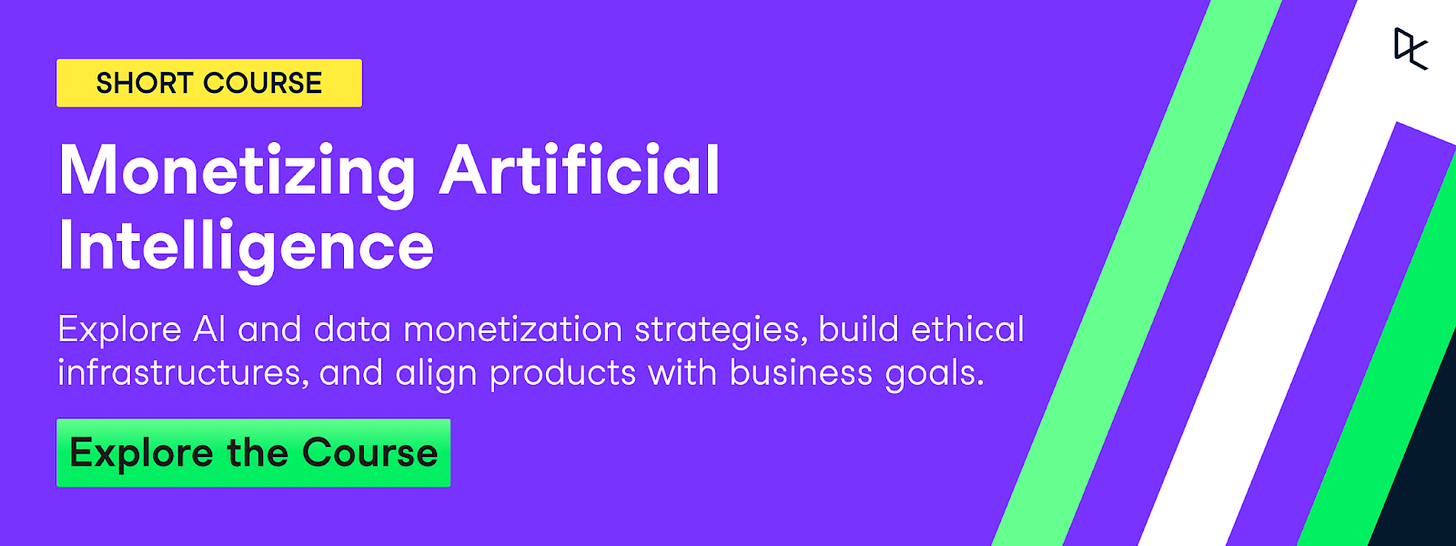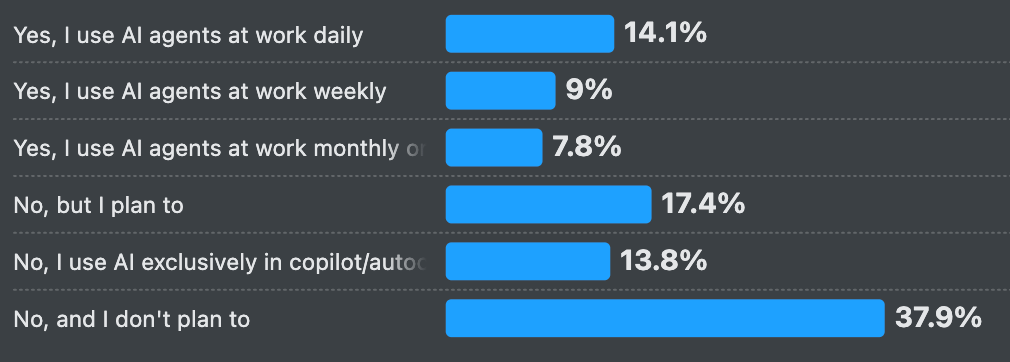What 49,000 Devs Think About AI, ChatGPT Gets an Upgrade, and More
Devs welcome AI with caution—and they’ve had enough of vibe coding.
Welcome to The Median, DataCamp’s newsletter for August 1, 2025.
In this edition: Stack Overflow releases the 2025 Developer Survey, ChatGPT launches Study Mode, Perplexity partners with Gannet, an AI-generated ad in the latest Vogue issue sparks debate, and OpenAI public chats surface on search engines, raising privacy concerns.
This Week in 60 Seconds
Stack Overflow Releases 2025 Developer Survey
Stack Overflow has published its 15th annual Developer Survey, with insights from over 49,000 developers. The report shows Python's adoption grew significantly this year, with a seven percentage point increase from 2024. While 84% of developers are now using or plan to use AI tools, a majority (52%) do not use AI agents specifically, and positive sentiment toward AI tools has dropped from over 70% in previous years to 60% this year. We'll dig into the surprising stats about AI trust and agent adoption in our "Deeper Look" section.
ChatGPT Launches New Study Mode
OpenAI has introduced "study mode" in ChatGPT, a new learning feature designed to guide users through problems step-by-step instead of providing immediate answers. The mode uses interactive prompts, hints, and personalized support to foster active learning and a deeper understanding of concepts. Study mode is available now to all logged-in Free, Plus, Pro, and Team users, with ChatGPT Edu access coming in the next few weeks. We'll give you a few tips for getting started with it in our "Deeper Look" section.
Perplexity Partners with Gannett for Content Licensing
AI search company Perplexity has announced a strategic content licensing agreement with Gannett, the largest local-to-national media organization in the United States. The deal will integrate journalism from USA TODAY and its 200+ local publications into Perplexity’s AI search results. This move, which follows the major deal between Amazon and The New York Times earlier this year, signals a growing trend of publishers formally partnering with AI companies to ensure their content is discoverable and to create new revenue streams in the AI era.
Vogue Ad With AI Model Sparks Industry Debate
The August issue of American Vogue has ignited controversy by featuring an ad for the brand Guess that used an AI-generated model. The campaign sparked a fierce debate among readers and fashion industry insiders after it was revealed that the model was not a real person. The backlash centers on fears that using AI models will eliminate jobs for human models, photographers, and makeup artists. Critics are also concerned that it creates even more unrealistic beauty standards, forcing consumers to compare themselves to digitally perfected individuals who don't actually exist.
OpenAI Removes Feature That Indexed Shared Chats on Google
SEO professionals recently discovered that ChatGPT conversations are being indexed and are discoverable on search engines like Google. While users must deliberately create a shareable link for this to occur, they may not realize their chats could become public through web searches. Acknowledging the feature "introduced too many opportunities for folks to accidentally share things they didn't intend to," OpenAI is removing the share-to-web option and is working to remove the indexed content from search engines. This news coincides with a warning from OpenAI CEO Sam Altman, who stated that there is currently no legal confidentiality for conversations with AI, even as many people use it as a therapist for highly personal problems.
A Deeper Look at This Week’s News
What 49,000 Developers Really Think About AI
The 2025 Stack Overflow Developer Survey is out, and it paints a complicated picture of AI's role in the development workflow.
The trust deficit
This year, AI tool usage is at an all-time high, with 84% of developers reporting they use or plan to use them, up from 76% last year. Yet, this rise in adoption is coupled with a significant drop in enthusiasm. Positive sentiment toward AI tools has fallen from over 70% in the last two years to just 60% this year.
The core of this cooling sentiment seems to be a profound lack of trust. A striking 46% of developers actively distrust the accuracy of AI tools, compared to only 33% who trust them. The number of developers who "highly trust" AI output is a mere 3%:
Responses: 33,244 (67.8%)
What’s your opinion on the accuracy of the output from AI tools?
This skepticism of developers is rooted in practical experience. The single biggest frustration, cited by 66% of developers, is dealing with "AI solutions that are almost right, but not quite." This leads directly to the second-biggest complaint: 45% find that "debugging AI-generated code is more time-consuming" than writing it themselves, which is in line with a study we previously quoted in The Median that found AI slows down experienced developers.
AI agents: Hype vs. reality
Nowhere is the gap between hype and reality more apparent than with AI agents. Despite the industry buzz around autonomous agents, a majority of developers (52%) are not using them, and a significant 38% have no plans to start.
Responses: 31,877 (65%)
The reasons for this hesitation are clear:
Accuracy and security: An overwhelming 87% of developers are concerned about the accuracy of AI agents, and 81% have concerns about the security and privacy of the data they handle.
Limited impact on teamwork: For those who do use agents, the benefits are mostly personal. Around 70% agree that agents increase their individual productivity and reduce time spent on tasks. However, only 17% believe agents have improved team collaboration.
Where AI fits (and where it doesn't)
Developers are drawing clear boundaries for AI integration. They are most comfortable using AI for well-defined, lower-risk tasks. Searching for answers, learning new concepts, and generating documentation are among the most common use cases.
However, they show strong resistance to using AI for high-responsibility, systemic tasks. A massive 76% do not plan to use AI for deployment and monitoring, and 69% are holding back from using it for project planning.
The message from the developer community is clear: the initial excitement has been replaced by a more sober, hands-on evaluation of where these tools provide real value and where they fall short. Developers are not rejecting AI, but about 80% of them are refusing to "vibe code." Instead, they are carefully integrating it as a practical tool, with a healthy dose of skepticism and a clear-eyed view of its current limitations.
A Practical Guide to ChatGPT's New Study Mode
OpenAI's new study mode transforms ChatGPT from a simple answer engine into an interactive learning partner. Instead of providing direct answers, it uses a Socratic method—asking questions, providing hints, and giving feedback—to guide you through complex topics. This approach promotes active learning and helps build a deeper understanding.
Here are three ways you can use study mode. For more detailed examples, including how to use it for language learning and math homework, check out our full post on the blog.
1. Learn a new topic from scratch
To learn a new skill like Python, simply ask study mode to teach you. It will start a dialogue to gauge your experience, then present concepts one by one, asking you to interact with each before moving on. This hands-on method replaces a static tutorial with an engaging, personalized lesson.
2. Prepare for your next technical interview
Tell it you're preparing for an interview, and it will simulate the entire process. For technical questions, it will ask for your high-level strategy before you code and provide iterative feedback on your solution.
3. Solve a difficult problem without spoilers
If you're stuck on a problem like a LeetCode challenge, study mode can guide you to the answer without just giving it away. It starts by helping you build intuition with the problem's examples. Then, it introduces the core concepts for the optimal solution piece by piece, letting you reach the "aha!" moment on your own.
Industry Use Cases
DeepMind's AlphaEarth Powers Global Environmental Monitoring
Google DeepMind has released AlphaEarth Foundations, an AI model that functions like a "virtual satellite," integrating petabytes of data from various sources into a single, high-resolution digital representation of the planet. Organizations are already using the model's dataset to tackle important environmental challenges. For example, the Global Ecosystems Atlas is using it to map and classify the world's ecosystems for conservation efforts, while MapBiomas is monitoring agricultural changes and deforestation in the Amazon rainforest with greater accuracy and speed.
Upwork Uses Llama to Help Freelancers Write Better Proposals
Freelance marketplace Upwork is using a fine-tuned Llama 3.1 model to power its AI assistant, Uma. The tool is designed to help freelancers win more work by improving the proposal writing process. Uma analyzes job postings, suggests relevant skills from a freelancer's profile, and drafts tailored proposals in real-time. Since implementing the Llama-powered system, Upwork has seen a 58.8% increase in user engagement compared to previous tools.
Delta Expands AI-Powered Ticket Pricing
Delta Air Lines is significantly increasing its use of artificial intelligence to set ticket prices, with plans to have AI determine the cost for up to 20% of its domestic flights by the end of the year. The system automates and enhances the dynamic pricing models airlines already use to adjust fares based on demand. The move has drawn scrutiny from U.S. senators over concerns about "hyper-personalized" pricing, though Delta states it does not use personal data to charge customers different prices for the same flight.
Tokens of Wisdom
People look for therapy, life‑coaching, and personal advice from ChatGPT. And that is a huge problem because conversations with ChatGPT are not legally protected and could be used in court.
—Sam Altman, CEO of OpenAI






Good going but ...
You missed a big one:
Gemini 2.5 Deep Think with "parallel thinking techniques"